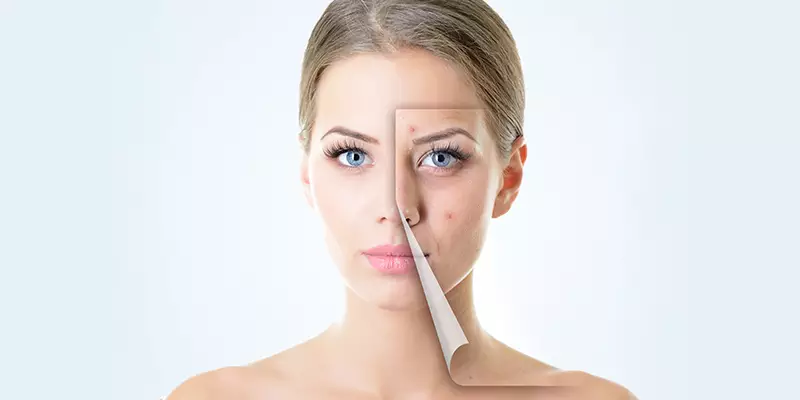
Pimples, also called acne, one of the most common skin disorder. Pimples occur when pores of the follicle on the skin become clogged with dead skin cells, oil, or bacteria. Increased oils (sebum) produced by the sebaceous glands is triggered by androgen hormones and in some case, the genetics. The exact cause is still not known; to prevent them from occurring. If the acne is not treated in early stage, it can cause severe damage to the underlying skin leading to severe acne and further permanent scarring. These may make you emotionally distress due to its appearance on face; and can greatly affect a person’s self-image and self-esteem.
Anyone can get pimples; whether it is oily or dry skin. Oily skin is more prone for pimples. In few individuals there is combination skin; noticed both dry areas and oily areas. The oily areas are T-zone of face like forehead, nose, and chin; because of too much oily sebum produced by your skin oily or sebaceous glands.
As by knowing our skin type will help: In choosing the right skin care product, like a non-comedogenic product that does not block pores.In advising to use cleanser or exfoliate or to moisturize
Here are few below mentioned tips to keep them in check, to reduce their severity and to get rid of the pimples:
It is understood people with oily skin is more prone for acne; it is important to remove excess oil, dirt, and sweat. Washing twice a day is advisable. It is routinely advisable to use gentle cleanser, toner and moisturizer as a good skin care and to prevent pimple breakouts.
Cleansing of the face plays a vital role in taking care of acne prone skin.
As most of these young adults do not get any time to follow complex skins care routine because they are engaged in their routine busy schedule. Most of the cleansing bars, antiseptic soaps and cleanser contain alpha and beta hydroxyl acids.
Most drugstores are packed with all sorts of facial cleansers. Trying to figure out which one is right for you can be overwhelming. A mild cleanser without a lot of ingredients and fragrances is important rather than having an expensive one.
Exfoliation can help remove excess dead skin cells. If these cells stay on your skin for too long, they can clog your pores and lead to breakouts.
Commonly there are two types of exfoliants used:
Chemical exfoliants: such 2% salicylic acid mask and < 10% glycolic acid mask or lotion; advisable to use once or twice a week depending upon your skin type.
Physical exfoliants: like scrubs or motorized facial brush; three to four times a week.
Advisable to start with fewer exfoliating sessions; and these exfoliants to be avoided in severe acne; as some types of exfoliants can worse.
If your skin over face is excessively dry, our body try to compensate for the dryness by overproducing oil; moisturizer keeps your skin hydrated and prevent breakouts of acne. Moisturizers to be used after you wash your face or if the skin is dry and keep your skin hydrated.
Moisturizers which are non-comedogenic and fragrance-free are advisable. As many moisturizers contain oil, synthetic fragrance, or other ingredients that may irritate skin and cause pimples. While treatment with retinoid may dry out your skin and will need a moisturizer to keep your skin hydrated.
If you’re dehydrated, your body may signal your skin’s oil glands to produce more oil leading to initiation of acne. Dehydration also gives your skin a dull appearance and promotes inflammation and redness.
Therefore drink plenty of water (2 to 3 litres daily) to keep your skin as well as body hydrated and helps in detoxifying the toxins present in your body. Well hydration gives a healthy glowing face and also helps to reduce acne.
Makeup can cause acne called acne cosmetica. This type of acne usually appears on chin, cheeks, or forehead as small, raised bumps. Hiding your acne under the layers of makeup will only make your skin condition worse and also result in more acne breakouts. Thus women should use minimal makeup, if not stop it to prevent acne problem.
Avoid greasy, heavy foundation makeup; and use products that are non-comedogenic, sheer, and fragrance-free.
The skin is exposed to dirt and bacteria constantly throughout the day. And each time you touch your face; these bacteria and dirt enter the skin pores with oil and results in infection.
Do not touch your face with unwashed hands because this may also spread the infection, which damages your facial skin.
Do not pick or pop your pimples; it may worse your problem and can cause marks and or even scars on the face.
Avoid oily, fried or junk foods and dairy products because these lead to acne breakouts. Foods processed in high sugar index white bread, sweets etc., and beverages such as chips, baked food made with white flour and soft drinks increases blood sugar levels and triggers acne. Consume more of fresh fruits, vegetables, and whole grains.
Stress doesn’t cause pimples, but it may cause acne break outs. Change in necessary lifestyle may relieve stress; as stresses will increases cortisol levels, which in turn can increase the oil secretion. Some options such as yoga, meditation, massage, sound therapy etc., relieve stress.
Long-term sun exposure dehydrates your skin and produce more oil, causing blocked pores and breakouts. Use wide-brimmed hats, umbrella and oil-free sunscreens.
Do regular exercise which is good for the body, mind, and skin. Exercise promotes healthy blood circulation, regulates hormones and helps reduce stress.
Good quality sleep well for about 6-8 hours is important. Lack of sleep could cause the body to release inflammatory mediators which can cause break outs or worsen acne.
Hair care products such as shampoos, conditioners, and styling products contain chemicals and oils that may clog the pores and cause acne or pimples near the hairline, forehead, and neck. It is advisable to wash the scalp thoroughly to clear any residue. Use products that are oil-free or non-comedogenic.
Smoking and alcohol does not cause acne. Smoking cigarettes may have a direct correlation to breakouts, indicating that smoking and acne is linked; cause more of non-inflammatory acne. Alcohol affects the levels of the hormones that regulate acne; by increasing testosterone levels and estradiol.
Medicines without prescription called OTC products containing mixed ingredients can be tried with caution. If OTC medicines fail to work, better consult dermatologist. They may prescribe topical medicines such as benzoyl peroxide (2.5%), salicylic acid, retinoids, clindamycin and or with oral antibiotic and retinoids or hormonal therapy, depending upon type and severity of acne.
When it comes to clear skin, preventive measures such as use of cleansers, moisturizers, and avoid makeup and touching your face with unwashed hands as the fingers may carry bacteria to spread the infection. Do not pick or pop your pimples; it may worse your problem and can cause marks and or even scars on the face.
Changes in certain lifestyle factors, like quality sleep, a healthy diet, and stress management, can help your skin.
If you’ve tried with all the above preventive measures and OTC products for your acne and if nothing works, make an appointment with expert skin professionals. They may prescribe treatments like antibiotics or retinoid or interventional dermatological procedure to help clear your skin.Almost everyone suffers from pimples at some point in their life. As many things can cause pimples such as hormones, genetics, dietary habits, stress. Pimples at one stage are annoying and other stage of severe acne; painful and emotionally distressing because of its appearance on face; and can greatly affect a person’s self-image and self-esteem. If left untreated causes permanent scarring and disfigurement.
Don’t panic if you get a pimple. Be patient and stick to the treatment plan you have chosen by your doctor and allow skin for a time to heal. Do not expect the acne or pimples to go away overnight. Patience and consistency are key factor; and sometimes take several weeks to produce result.
